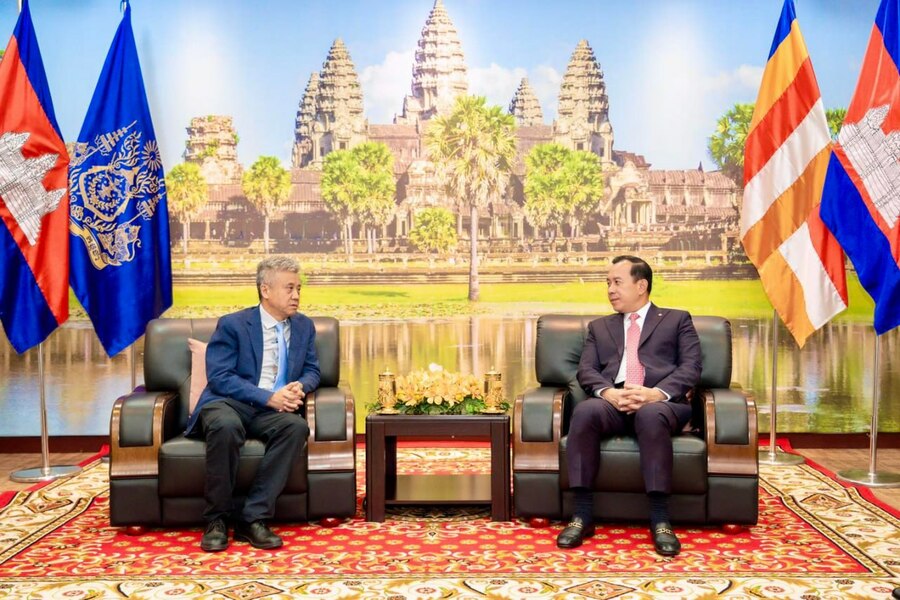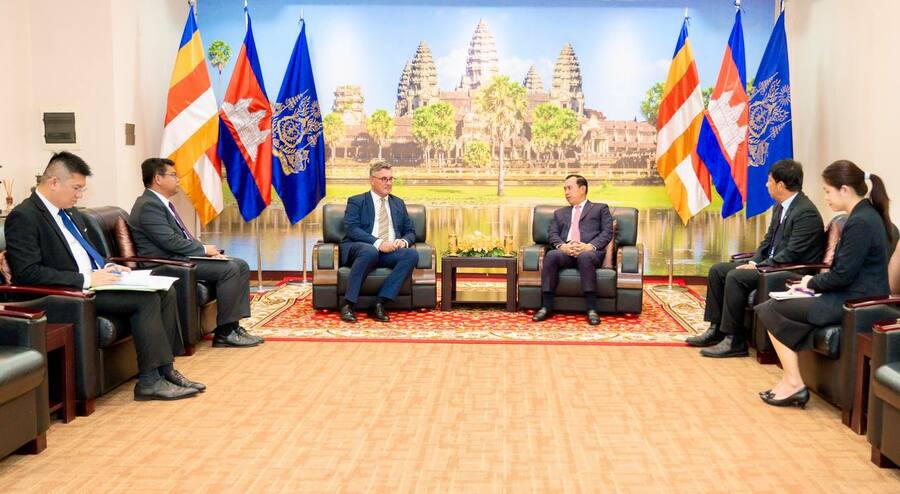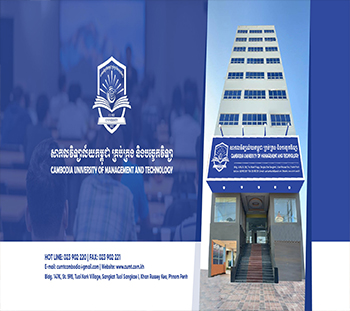
Matter of principle: Cambodia willing, but not obliged to share info on Funan Techo Canal


During a routine press briefing on April 11, the Deputy Spokesperson of the Vietnamese Ministry of Foreign Affairs, Doan Khac Viet, urged Cambodia to provide information and conduct an assessment regarding the potential impacts of the Funan Techo Canal project on the water resources and ecological balance of the Mekong Delta region.
“Vietnam stands in support of the developmental aspirations of all Mekong River basin countries. We stress the crucial need for enhanced cooperation to ensure the efficient and sustainable management of Mekong River water resources,” Viet emphasised during the briefing.
His remarks came in response to inquiries about Cambodia’s proposed construction of the Funan Techo Canal, a project estimated at $1.7 billion set to be executed by a Chinese company through a build-operate-transfer (BOT) arrangement.

The canal, spanning approximately 180 km, aims to link the Phnom Penh River port with the Gulf of Thailand in southwestern Cambodia. It will originate from Prek Takeo on the Mekong River, winding its way through Prek Ta Ek and Prek Ta Hing on the Bassac River in Kandal province’s Koh Thom district, and extending into the coastal province of Kep.
According to documentation submitted by Cambodia to the Mekong River Commission in August 2023, the canal is slated to become operational by 2028.
“Vietnam attaches great importance to gaining insights into the Funan Techo Canal Project,” Viet said.
“We have urged Cambodia to engage in close collaboration with Vietnam and the Mekong River Commission, facilitating the exchange of information and conducting thorough assessments of the project’s potential impacts on water resources and ecosystems in the Mekong Delta region.
He underscored that the responsible and sustainable utilisation of Mekong River water resources is paramount for the basin’s sustainable development, the welfare of communities within the region, and the fostering of unity among riparian states.
When contacted by Khmer Times yesterday, So Naro, Minister Delegate attached to the Prime Minister in charge of ASEAN affairs, said Cambodia is not legally required to submit any document to the Vietnamese government regarding the studies and construction of the Funan Techo Canal, which since its conception has been considered a game-changer in the Kingdom’s infrastructure.

However, he added that the Vietnamese authorities can still have access to those files.
“All documents of the studies on the canal related to the impacts on the environment and the water resources in the region, which took nearly 26 months to be completed, have already been submitted by the Cambodian government to the Mekong River Commission, so the Vietnamese authorities can request access to those files,” he explained.
“I also want to clarify that during the last visit of Samdech Prime Minister Hun Manet to Vietnam, the Premier also informed and gave an explanation to the Vietnamese President, and to say again, the Funan Techo Canal will not have an impact on the Mekong Delta Region – not to mention that this project will be built on a tributary of the Mekong River, not the Mekong River itself.”
Naro added that technically speaking, Cambodia is not responsible for asking for permission or consultation from any state or non-state party, just like other countries in the region construction projects on tributaries within their territories.

“It would be more complicated if we were building a dam or something else on the Mekong River, but this is not the case.”
Naro dismissed all attacks on the Funan Techo Canal, adding that some of them are “ridiculous.” He also went on to call the project a “historic milestone” in the country’s effort to enhance its self-reliance.
“We are not having any negative thoughts about Vietnam; however, when we depend on others for our own survival, it means we are losing some part of our independence. That is why the Funan Techo Canal is not only a historic part of the country’s infrastructure but also a magnificent achievement in Cambodia’s international politics.”
Naro explained that Vietnam may experience a decrease in tax revenue and fees collected from Cambodian goods and ships. However, it’s crucial to recognise the potential for far greater losses (for Cambodia), including the risk of losing complete access to the sea in the event of a dispute between the two nations.

“We’ve witnessed tangible instances, such as during the COVID-19 pandemic, where Vietnam imposed restrictions on movement within its borders while Cambodia sought normal trade flows,” he said. “Similarly, China’s restrictions during the pandemic led to global shortages of goods, demonstrating the unpredictable nature of such situations.”
Still, he clarified that even when the Funan Techo Canal’s construction is completed, Cambodia will still rely on the sea route directed from Vietnam when it comes to large-scale cargo transport, as the Cambodian canal only has the capacity to support loads 2,000 to 3,000 tonnes. He added that contrary to allegations, the planned canal is only 5-6 metres deep, thus making it impossible for a warship to use.
The claim made by Naro is supported by Kin Phea, director-general of the International Relations Institute of Cambodia, who said that the Cambodian government has to do everything within its capacity to complete the construction of the Funan Techo Canal, as it is expected to pave the way for more expansion of agriculture, irrigation, aquaculture, and livestock development areas, not to mention the creation of more jobs at Sihanoukville Autonomous Port, Phnom Penh Autonomous Port, and other ports.

“It is not necessary at all for Cambodia to submit anything to Vietnam, as Vietnam is not the sole owner of the Mekong River,” he said.
Similarly, Thong Mengdavid, a political geography researcher at the Institute for International Studies and Public Policy (IISPP) of the Royal University of Phnom Penh (RUPP), said the development of the Funan Techo Canal is solely within Cambodia’s domestic and sovereign affairs.
“While Cambodia has informed and explained the proposal to the Mekong River Commission to ensure transparency and sustainable development, ultimately, it falls under Cambodia’s jurisdiction,” he said.
He went on to criticise Dinh Thien and Thanh Minh, the researchers from a Vietnamese state-backed Oriental Research Development Institute who have recently warned that the canal could serve dual purposes, facilitating both civilian transportation and potentially accommodating the Chinese military presence in Cambodia. Specifically, they raise concerns about the canal granting Chinese warships access to the Ream Naval Base and enabling them to travel deep into Cambodia, potentially nearing the Cambodia-Vietnam border.
“Such an accusation is baseless and unrealistic, as Cambodia adheres to a core principle of neutrality and non-interference, prohibiting foreign military presence or bases within its territory,” he said.
“Despite the Funan Techo Canal project holding significant potential for economic development and connectivity enhancement, its implications for regional security and sovereignty warrant careful consideration and diplomatic engagement among relevant stakeholders. Henceforth, Cambodia policymakers must prioritise national interests while also considering regional dynamics, diplomatic relations with key stakeholders, and geopolitical tensions in the region, namely US-China rivalry and the South China Sea issue,” Mengdavid added.
Prime Minister Hun Manet has also reaffirmed that the upcoming Funan Techo Canal will boost the country’s economy while posing no security threats to other countries.
“We commit to make friends with all countries. We do not regard any country as a foe,” he said while inaugurating the first standard and largest dairy farm in Cambodia – Kirisu in Kandoeung commune, Bati district, Takeo province.
He added that the Cambodian Constitution does not allow foreign military bases on its territory, and Cambodia has no ambition or intention “to oppose our own Constitution. We do not allow any country to place military bases on Cambodian territory”.
“We do not allow our country to be used as a base for another country, let alone a military base, hostile activities are not permitted to be conducted against any country from Cambodia,” Mr Hun Manet said, adding that the canal could not accommodate warships as alleged.
The Ministry of Public Works and Transport recently announced that the government is actively pursuing negotiations with Chinese development partners for completion of the formal agreements to begin construction of the canal to complete key terms and sign a concession agreement for the large-scale logistics project by June or July this year.
According to Naro, it has been estimated that the construction of the Funan Techo Canal will begin in the fourth quarter of 2024.






